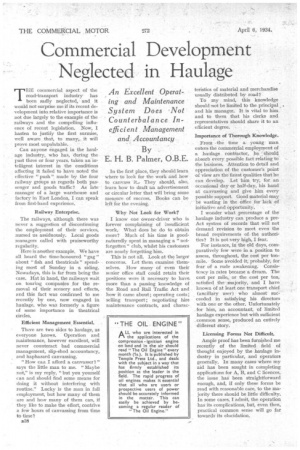Commercial Development Neglected• in Haulage
Page 56

If you've noticed an error in this article please click here to report it so we can fix it.
An Excellent Opera!
,
ing and Maintenance System Does 'Not Counterbalance Incient Management and Accountancy
By E. H. B. Palmer, O.B.E.
THE commercial aspect of the road-transport industry has been sadly neglected, • and it would not surprise me if its recent development into relative importance is not due largely to the example of the railways and the compelling influence of recent legislation. Now, I hasten to justify the first surmise, well aware that, to many, it will prove most unpalatable.
Can anyone engaged in the haulage industry, who has, during the past three or four years, taken an intelligent interest in the conditions affecting it failed to have noted the
effective " push ", made by the four railway groups as regards both passenger and goods traffic? As ate manager of a large warehouse and factory in East London, I. can speak from first-hand experience.
Railway Enterprise.
The railways, although there was never a suggestion of discontinuing the employment of their services, nursed us assiduously. Local goods managers called with praiseworthy regularity.
Here is another example. We have all heard the time-honoured " gag " about "fish and theatricals" spending most of Sunday in •a siding. Nowadays, this is far from being the case. Hat in hand, the railways wait on touring companies for the removal of their scenery and effects, and this fact was confirmed to me recently by one, now engaged in haulage, who was formerly a figure of some importance in theatrical circles.
Efficient Management. Essential.
There are two sides to haulage, as everyone knows. Operation and maintenance, however excellent, will never counteract bad commercial management, slip-shod accountancy, and haphazard canvassing.
"How can I afford a canvasser?" says the little man to me. "Maybe not," is my reply, "but you yourself can and should find some means for doing it without interfering with routine." Lucky is the man in full employment, but how many of them are and how many of them can, if they like to make the effort, contrive a few hours of canvassing from time to time?
B38
In the first place, they should learn where to look for the work and how to canvass it.,. They should, also, learn how to draft an advertisement or circular letter that will bring some measure of success. Books can be left for the evening.
Why Not Look for Work?
I know one owner-driver who is forever complaining of insufficient work. What does he do to obtain more? Much of his time is goodnaturedly spent in managing a " notforgotten " club, whilst his customers are nearly forgetting him.
This is not all. Look at the larger concerns. Let them examine themselves. How many of even their senior Office staff could retain their positions were it necessary to have. more than a passing knowledge of the Road and Rail Traffic Act and how it came about ; operating costs ; selling transport; negotiating hire maintenance contracts, and charac teristics of material and merchandise usually distributed by road?
To my mind, this knowledge should not be limited to the principal and his manager. It is vital to him and to them that his clerks and representatives should share it to an efficient degree.
Importance of Thorough Knowledge.
From the time a young man enters the commercial employment of a haulage contractor, he should absorb every possible fact relating to the business. Attention to detail and appreciation of the customer's point• • of view are the finest qualities that he can develop. Let him try, for an occasional day or half-day, his hand at canvassing and give him every possible support. Good material may • be wasting in the office for lack of initiative and opportunity.
I wonder what percentage of the haulage industry can produce a preAct system of records that will not demand revision to meet even the broad requirements of the authorities? It is not very high, I fear.
For instance, in the old days, comparatively few were in a position to assess, throughout, the cost per tonmile. Some avoided it, probably, for fear Of a rude awakening. Consistency in rates became a dream. The cost per mile, or the cost per ton, satisfied the majority, and I have known of at least one transport chief (ancillary user) who almost succeeded in satisfying his directors with one or the other. Unfortunately for him, an accountant, of limited haulage experience but with sufficient , common sense, produced an entirely different story.
Licensing Forms Not Difficult.
Ample proof has been furnished me recently of the limited field of thought enjoyed by the haulage industry in particular, and operators generally. In many cases where my aid has been sought in completing applications for A, B, and C licences, the issue has been straightforward enough, and, if only these forms be read with reasonable care, to the majority there should be little difficulty. In some cases, I admit, the operation has its complications, but, even then, practical common sense will go far towards its elucidation.




































































































